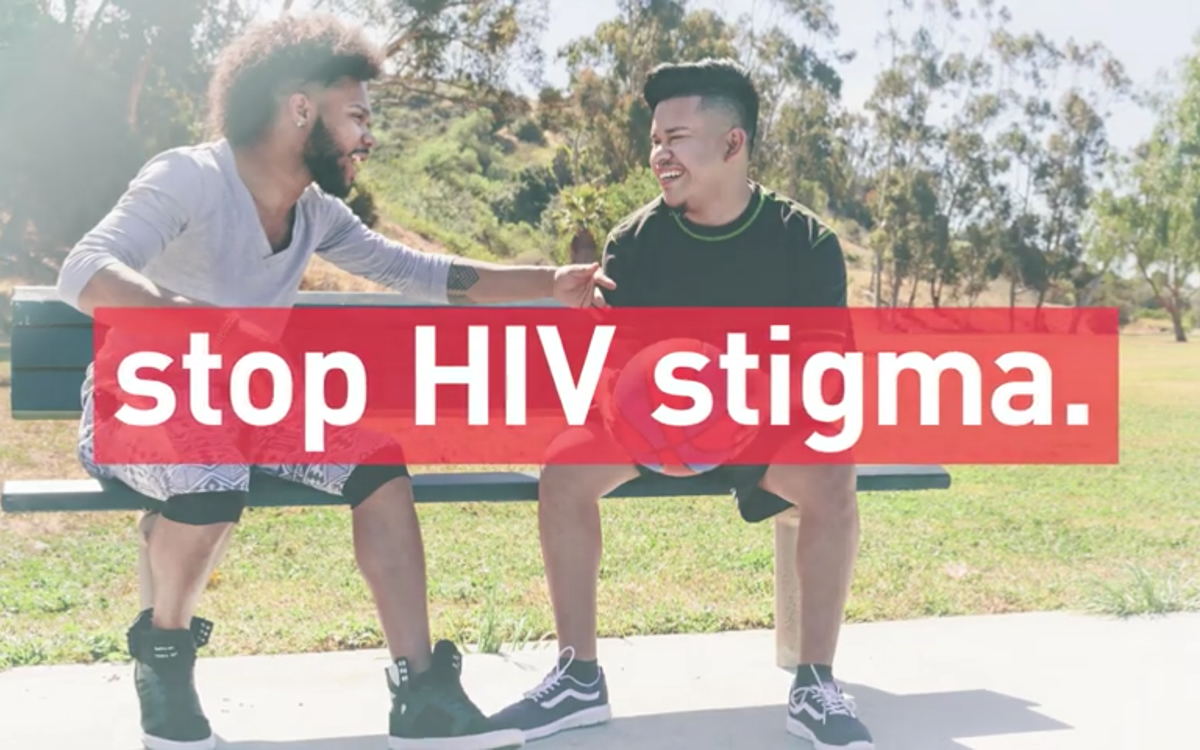National
AIDS advocacy groups launch first ‘Zero HIV Stigma Day’
Organizers say patients continue to face hardship from bias

A consortium of four community, medical, and urban health organizations announced they have designated July 21 as the first Zero HIV Stigma Day as a new international awareness day drawing attention to the “persistent levels of stigma experienced by people living with and affected by HIV.”
A statement released by the four groups organizing Zero HIV Stigma Day says July 21 was chosen to commemorate the birthday of the late South African AIDS activist Prudence Mabele, who advocated for the rights of women and children living with HIV and against gender related violence.
Organizers say Mabele was the first Black South African woman to publicly share her HIV status in 1992. She died in 2017.
“In this fifth decade of the global HIV pandemic, stigma continues to undermine progress and, in combination with fear and shame, is still driving late diagnosis of HIV in a way that is unacceptable and entirely preventable,” said Parminder Sekhon, CEO of NAZ, a minority-led HIV and sexual health organization in the United Kingdom that has provided AIDS-related services and care for more than 30 years. NAZ is one of the four groups organizing Zero HIV Stigma Day.
“If we are to have any hope of ending HIV and crossing the finishing line together, we must join forces, voice by voice, to end HIV stigma,” Sekhon said in the statement.
The other organizations that joined NAZ to launch Zero HIV Stigma Day include the D.C.-based International Association of Providers of AIDS Care (IAPAC); Global HIV Collaborative, which says it works to improve HIV outcomes for the Black community globally; and Fast-Track Institute, which was created to support cities and municipalities worldwide in their efforts end the AIDS pandemic and other diseases.
“As a person living with HIV who also works in the field, I have seen the detrimental effects HIV stigma has in preventing individuals from accessing HIV services but, more importantly, from living positively with HIV for fear of societal rejection,” said Kalvin Pugh, the Senior Program Manager for Community Engagement with IAPAC.
“This is especially true for communities that face intersectional forms of oppression such as racism, sexism, homophobia, and transphobia,” Pugh said. “Ending the HIV pandemic cannot be achieved unless we take action to end HIV stigma for all,” he said.
Jose M. Zuniga, president and CEO of both IAPAC and the Fast-Track Cities Institute, said he and other organizers of Zero HIV Stigma Day were hopeful that the commemorative day will lead to actions needed to end HIV stigma and hasten efforts to end the AIDS pandemic once and for all.
“Zero HIV Stigma Day, and its full year of affiliated actions, represents a concerted global effort to harness our collective power toward the aim of realizing the human right to dignity, health and well-being for everyone everywhere,” he said.
Detailed background information about HIV stigma and ways it can be addressed can be accessed at: cdc.gov/hiv/basics/hiv-stigma/index.html.
Federal Government
UPenn erases Lia Thomas’s records as part of settlement with White House
University agreed to ban trans women from women’s sports teams

In a settlement with the Trump-Vance administration announced on Tuesday, the University of Pennsylvania will ban transgender athletes from competing and erase swimming records set by transgender former student Lia Thomas.
The U.S. Department of Education’s Office for Civil Rights found the university in violation of Title IX, the federal rights law barring sex based discrimination in educational institutions, by “permitting males to compete in women’s intercollegiate athletics and to occupy women-only intimate facilities.”
The statement issued by University of Pennsylvania President J. Larry Jameson highlighted how the law’s interpretation was changed substantially under President Donald Trump’s second term.
“The Department of Education OCR investigated the participation of one transgender athlete on the women’s swimming team three years ago, during the 2021-2022 swim season,” he wrote. “At that time, Penn was in compliance with NCAA eligibility rules and Title IX as then interpreted.”
Jameson continued, “Penn has always followed — and continues to follow — Title IX and the applicable policy of the NCAA regarding transgender athletes. NCAA eligibility rules changed in February 2025 with Executive Orders 14168 and 14201 and Penn will continue to adhere to these new rules.”
Writing that “we acknowledge that some student-athletes were disadvantaged by these rules” in place while Thomas was allowed to compete, the university president added, “We recognize this and will apologize to those who experienced a competitive disadvantage or experienced anxiety because of the policies in effect at the time.”
“Today’s resolution agreement with UPenn is yet another example of the Trump effect in action,” Education Secretary Linda McMahon said in a statement. “Thanks to the leadership of President Trump, UPenn has agreed both to apologize for its past Title IX violations and to ensure that women’s sports are protected at the university for future generations of female athletes.”
Under former President Joe Biden, the department’s Office of Civil Rights sought to protect against anti-LGBTQ discrimination in education, bringing investigations and enforcement actions in cases where school officials might, for example, require trans students to use restrooms and facilities consistent with their birth sex or fail to respond to peer harassment over their gender identity.
Much of the legal reasoning behind the Biden-Harris administration’s positions extended from the 2020 U.S. Supreme Court case Bostock v. Clayton County, which found that sex-based discrimination includes that which is based on sexual orientation or gender identity under Title VII rules covering employment practices.
The Trump-Vance administration last week put the state of California on notice that its trans athlete policies were, or once were, in violation of Title IX, which comes amid the ongoing battle with Maine over the same issue.
New York
Two teens shot steps from Stonewall Inn after NYC Pride parade
One of the victims remains in critical condition

On Sunday night, following the annual NYC Pride March, two girls were shot in Sheridan Square, feet away from the historic Stonewall Inn.
According to an NYPD report, the two girls, aged 16 and 17, were shot around 10:15 p.m. as Pride festivities began to wind down. The 16-year-old was struck in the head and, according to police sources, is said to be in critical condition, while the 17-year-old was said to be in stable condition.
The Washington Blade confirmed with the NYPD the details from the police reports and learned no arrests had been made as of noon Monday.
The shooting took place in the Greenwich Village neighborhood of Manhattan, mere feet away from the most famous gay bar in the city — if not the world — the Stonewall Inn. Earlier that day, hundreds of thousands of people marched down Christopher Street to celebrate 55 years of LGBTQ people standing up for their rights.
In June 1969, after police raided the Stonewall Inn, members of the LGBTQ community pushed back, sparking what became known as the Stonewall riots. Over the course of two days, LGBTQ New Yorkers protested the discriminatory policing of queer spaces across the city and mobilized to speak out — and throw bottles if need be — at officers attempting to suppress their existence.
The following year, LGBTQ people returned to the Stonewall Inn and marched through the same streets where queer New Yorkers had been arrested, marking the first “Gay Pride March” in history and declaring that LGBTQ people were not going anywhere.
New York State Assemblywoman Deborah Glick, whose district includes Greenwich Village, took to social media to comment on the shooting.
“After decades of peaceful Pride celebrations — this year gun fire and two people shot near the Stonewall Inn is a reminder that gun violence is everywhere,” the lesbian lawmaker said on X. “Guns are a problem despite the NRA BS.”
New York
Zohran Mamdani participates in NYC Pride parade
Mayoral candidate has detailed LGBTQ rights platform

Zohran Mamdani, the candidate for mayor of New York City who pulled a surprise victory in the primary contest last week, walked in the city’s Pride parade on Sunday.
The Democratic Socialist and New York State Assembly member published photos on social media with New York Attorney General Letitia James, telling followers it was “a joy to march in NYC Pride with the people’s champ” and to “see so many friends on this gorgeous day.”
“Happy Pride NYC,” he wrote, adding a rainbow emoji.
Mamdani’s platform includes a detailed plan for LGBTQ people who “across the United States are facing an increasingly hostile political environment.”
His campaign website explains: “New York City must be a refuge for LGBTQIA+ people, but private institutions in our own city have already started capitulating to Trump’s assault on trans rights.
“Meanwhile, the cost of living crisis confronting working class people across the city hits the LGBTQIA+ community particularly hard, with higher rates of unemployment and homelessness than the rest of the city.”
“The Mamdani administration will protect LGBTQIA+ New Yorkers by expanding and protecting gender-affirming care citywide, making NYC an LGBTQIA+ sanctuary city, and creating the Office of LGBTQIA+ Affairs.”




















